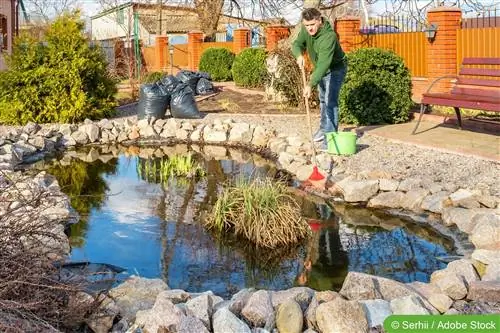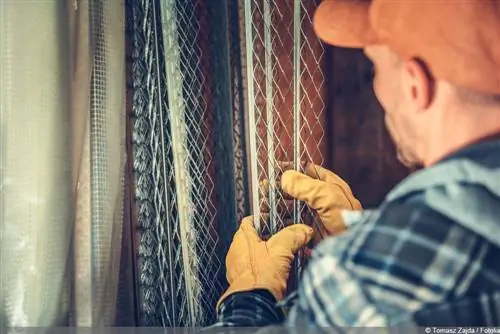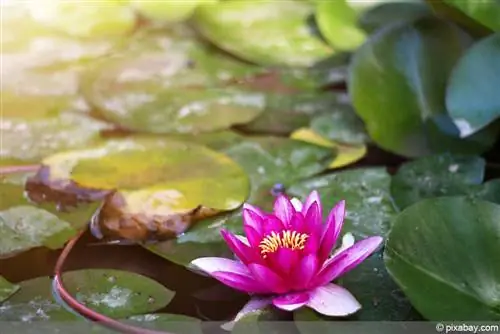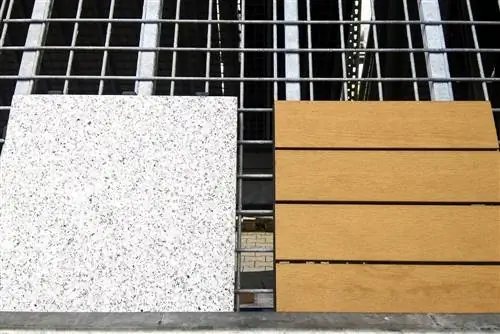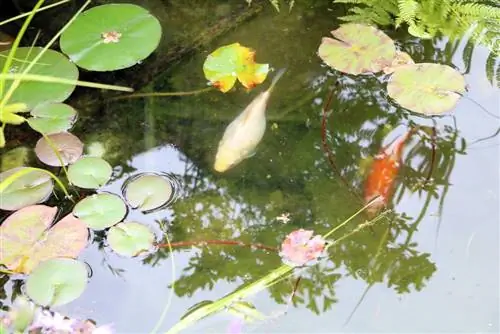- Author admin caroline@plants-knowledge.com.
- Public 2023-12-17 03:39.
- Last modified 2025-06-01 06:48.
Pond owners know the problem. If you forget to clean the pond, algae, unpleasant smells and rotting layers of mud form. This often results in animals and plants in the pond dying. Regular cleaning of the entire system is therefore urgently necessary. This cleaning should be done according to the season.
Basic cleaning in spring
After the winter months, dead plant parts and leaves have settled at the bottom of the pond, where they rot. The resulting toxins endanger the flora and fauna on and in the pond system. For this reason, thorough cleaning is recommended in spring. The rule of thumb for every hobby gardener is: work from the bottom up! If there are no fish in the pond, all of the water in the garden pond must be drained. This is done with a pump and hose. A quarter of the old water quantity should remain in the pond if fish are resident, as a complete renewal of the water can shock the fish. With the help of this amount of water, the pond system regenerates itself and returns to its original quality.
When sucking in three quarters of water, a sieve should be used in front of the hose so that no smaller fish are sucked in. Once the water level has been reached, the plants and their growth must first be checked. Any plants that have grown too far should be shortened and cut into shape. Old shoots must be removed as they tend to rot. To clean the pond liner, we recommend a high-pressure cleaner, which quickly and efficiently removes algae and sludge. After cleaning the edge attachment made of gravel or stones, the dirty remaining water is pumped out. Leaves and plant parts must also be disposed of before the pond is slowly filled with fresh water again. The slow inflow of fresh water allows plants and animals to get used to the new water composition and temperature, and any remaining dirt particles settle to the bottom of the pond.
Preserve the beautiful sight
A sea of plants around the pond, clear water with a view of the fish, crabs and mussels, pleasant scents around the pond - optimal garden design with a water garden. Unfortunately, this is often not the case when autumn leaves are blown into the pond, parts of the plants die off on the edge of the bank and the rain showers in autumn wash soil and mulch into the pond system. This naturally leads to contamination and unpleasant smells. In the worst case, the fish and plants around and in the pond die. On the one hand, because the decomposition of plant remains produces foul gases, which do not allow gas exchange in winter when the ice cover is closed, and on the other hand, because the nutrients from the dead plants get into the pond water, which in turn promotes the formation of algae.
The best preventative measure before autumn is a pond protection net, which keeps blowing leaves away from the water. The plants around the pond should also be cut back generously so that the dying parts cannot get into the water. If parts can already be seen in the water, a so-called pond gripper can help. With its long handle you can also grab parts of plants that have already fallen and remove them. Only cut back flowering grasses and plants in autumn and winter after they have bloomed and remove dead plant parts, so you have a beautiful view even in winter and flora and fauna will thank the hobby gardener.
Preparing the pond system for winter
Before winter, under no circumstances should the water be drained with the pump or pond vacuum, because many small animals seek protection from the cold in the mud on the ground. The necessary gas exchange can be carried out using an ice preventer. This ensures a piece of free ice during strong winter months. Reeds and grass blades as well as perennials that protrude from the water at the edge also ensure this gas exchange. Similar to a straw, fresh air can get under the ice cover. In low pond systems that may freeze completely in severe frost, the fish should be overwintered in an aquarium filled with pond water. Aquatic plants that are at high risk of frost, such as: B. the water lily should overwinter in a bucket of pond water. In addition to the endangered plants and animals, the pond pump is also at risk in the event of a severe onset of winter.
If this is not between 60 and 80 cm deep in the ground and the water reaches a constant temperature below 12 °C, the pump and filter must be removed. You should also know that the pond bacteria no longer remove nutrients from the water at this permanent temperature of 12 °C. Only a skimmer or surface vacuum cleaner that can be operated with a pump can remain connected until the danger of leaves and plant residues entering the pond water in late autumn or early winter is averted.
Pond cleaning throughout the year
Unfortunately, hobby gardeners can't just sit back and relax when they have a pond. However, the summer and winter months are not as labor intensive. The only thing that needs to be done in winter is to move the fish and sensitive plants. In addition, there should always be a hole in the ice cover of the pond so that the putrid gases can escape and small animals can breathe. Plant remains and blown-in leaves must also be removed here and there all year round.
In the summer months, the gardener can enjoy the beautiful sight of a clean pond. Visually, this time of year is the most beautiful of the year and intervention is only necessary in urgent cases. Everything is blooming, the fish are bustling and insects, frogs and dragonflies populate the pond. If the summer months are too hot and dry and too much water evaporates, it is advisable to fill the pond with fresh water. Pond owners are in demand in the spring and autumn months. This involves complete cleaning, removing the dead plant residue, removing the leaves, reinserting the plants and fish as well as the pump with filter system, removing algae and possibly planting new plants at the edge of the pond. Helpful garden tools when working around the pond are:
- Landing net for removing algae and leaves
- High-pressure cleaner - for cleaning stones and pond liner
- Skimmer - surface vacuum cleaner
- Pond pump or vacuum cleaner with filter system and sieve
- Pond protection net
- Ice preventer
- Garden scissors,
- Aquarium,
- Water bucket,
- Planting supplies
and possibly chemical or biological algae remover.
Things worth knowing about pond cleaning in brief
Cleaning the garden pond is an essential part of pond care. Cleaning the pond in spring should be an absolute must. After winter, the water is very rich in nutrients as these are hardly used up in winter. An ideal condition for algae, which can then quickly become a plague.
- Pond cleaning should always be accompanied by partially replacing the water in the pond. This also removes some of the excess nutrients from the water.
- Pond cleaning also includes removing the sludge on the bottom of the pond. This is made up of dead plant parts, fish excrement and many other substances that form from things that have fallen in.
- You can use a special vacuum cleaner, which you can either purchase or rent.
- You can also prefer thorough manual work and tackle the pond sludge with a shovel, broom and garden hose.
The result should be the same in all cases: the pond sludge has been carefully removed. Pond cleaning should also include caring for aquatic plants. This includes removing dead or damaged parts so that they do not contaminate the pond again.
Since the pond needs to be cleaned again in the fall, this involves preparing for winter as a further care process for the aquatic plants. This manifests itself in cold-sensitive plants by removing them from the garden pond and placing them in their winter quarters. If the plants have become too large, autumn is the best time to divide them.
Tip:
In autumn, to protect the pond, it is advisable to put a net over it so that not too many leaves can fall into it and the cleaning operation is not prolonged unnecessarily.

